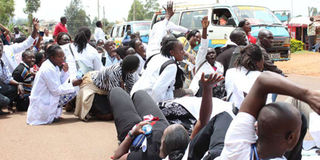Time to fix public health care staff woes

Health workers in Nyamira County demonstrate over unpaid allowances on February 23, 2017. Access to quality and affordable health care is a right guaranteed by the Constitution. PHOTO | BENSON MOMANYI | NATION MEDIA GROUP
What you need to know:
- The WHO classifies Kenya among countries with a critical shortage of health workers.
- A national conversation on the recent disputes would be a good place to start.
In the past six months, Kenyans have been caught in the middle of disputes between health workers and the national and county governments.
Not once but twice. Both times, the rows escalated from issues around collective bargaining agreements.
The first led to the 100-day strike by doctors, while the second one, which is ongoing, involves nurses.
AILING SECTOR
Both have caused pain and suffering for innocent Kenyans.
Some patients have died, while others and their loved ones have suffered more than they ought to have.
Frankly, our public health care system cannot weather these increasingly frequent disruptions of services.
The public health care system has been struggling.
The World Health Organization (WHO) classifies Kenya among countries with a critical shortage of health workers.
SHORTAGE OF WORKERS
According to a Ministry of Health report titled ‘Human Resources for Health (HRH) Assessment Report for Northern Kenya’, published in 2013, Kenya has an average of 19 doctors and 166 nurses per 100,000 population, compared to the WHO’s recommended minimum staffing level of 36 doctors and 356 nurses per 100,000 of the population.
Health workers - doctors, nurses, clinical officers and midwives - are one of the core building blocks of the health system.
It is, therefore, important that we listen to their concerns.
INDUSTRIAL ACTION
It is in the interest of all, including those negotiating on behalf of the government that the public health system works.
Who better to help us improve the system than those who work in it?
An MP was recently reported in the media as saying that if re-elected, she intends to sponsor a Bill in Parliament to outlaw industrial action by health workers.
Such a Bill would be contrary to Article 41 of the Constitution of Kenya, 2010, on labour relations.
This guarantees every worker the right to engage in collective bargaining and take industrial action.
SALARY
Besides being illegal, such a Bill would be akin to cutting off our nose to spite our face.
Our health workers might leave the public service and move to private practice or worse, to other countries, to the detriment of the public health system.
In a report published in 2013 titled ‘A Universal Truth: No Health Without a Workforce’, the WHO warned of a global shortage of health workers.
The risk and cost of Kenyan health workers seeking greener pastures was documented in a study published by in 2008 by the Ministries of Health, and Labour, and the International Organisation on Migration (IOM), among other stakeholders.
It found that seven out of 10 of health workers surveyed wanted to emigrate because of, among other factors, poor remuneration and working conditions.
HUMAN RIGHT
Instead of threatening health workers into submission, a national conversation on the recent disputes would be a good place to start.
It will help to ensure that all Kenyans have access to high quality services in public health facilities.
This is impossible without adequate and motivated workers.
Access to quality and affordable health care is a right guaranteed by the Constitution.
MOTIVATE WORKERS
We must deal with staff welfare concerns once and for all.
The result will be a well-motivated workforce more likely to provide quality services.
This will cost a lot of money, but it will be a worthy investment for the people of Kenya.
The sticking point is where to get the funds. That conversation can help to crack this difficult question.
It points to the need for discussions on the causes of disputes between the government and health workers’ unions and how to solve them.
Ms Samba is the Kenya country director at Deutsche Stiftung Weltbevoelkerung (DSW), an international development agency. [email protected]




